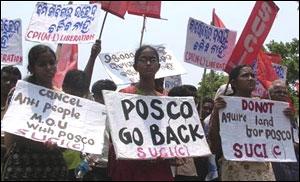Many people, not only in business but in society at large, still see progress and social justice as an either-or choice, writes Rajni Bakshi.
Violent clashes between local people and the company POSCO in Orissa are a multi-dimensional tragedy. Human rights are being violated and the project remains in doldrums. What makes it all the more tragic is that this situation is avoidable.

For quite some years now there has been a buzz within business circles about doing things differently so that such clashes do not occur. However, realities on the ground indicate that such thinking may still be negligible. There is an urgent need to find ways to change this.
It was at a meeting on 'Conscious Capitalism' in Mumbai some years back, that Jamshed Irani, then still a director of Tata Sons, declared that the old definition of factors of production - land, labour and capital - is no longer valid. Consent and support of the local people is now a vital prerequisite for a successful industrial project, Irani said.
Business thinkers and management gurus have generated a substantial body of literature on the need for companies to create new ways of working that are both socially and environmentally sustainable.
For example, it was in 2008 that Peter Senge co-authored a book titled ‘The Necessary Revolution: How Individuals and Organizations Are Working Together to Create a Sustainable World.” Senge, a leading business thinker, teaches at MIT in Boston. In this book he posed some fundamental questions.
For example, Senge asked: “How is it that societies that trumpet democratic values seem to be blind to the fact that their most powerful institutions (corporations) operate much as totalitarian states? How did we lose sight of the historical perspective that the privatization of wealth was a privilege granted by corporate charter rather than a right gained merely by personal ambition?”
‘Necessary Revolution’ brought together the experiences and experiments of those individuals and companies that acknowledge that ‘business as usual’ is no longer enough. This work is based on the premise that while there is a long way to go “the era of denial has ended.”
More recently management gurus Michael Porter and Mark Kramer have been making waves with the concept of ‘shared value’. In an article published by Harvard Business Review Porter and Mark Kramer argued that: “The capitalist system is under siege. In recent years business increasingly has been viewed as a major cause of social, environmental, and economic problems. Companies are widely perceived to be prospering at the expense of the broader community.”
As a counter to this Porter and Kramer offered the concept of shared value, “which involves creating economic value in a way that
also creates
value for society by addressing its needs and challenges. Businesses must reconnect company success with social progress.”
Porter and Kramer are not suggesting that all societal problems can be solved through this approach. But, they wrote: “…shared value offers corporations the opportunity to utilize their skills, resources, and management capability to lead social progress in ways that even the best-intentioned governmental and social sector organizations can rarely match. In the process, businesses can earn the respect of society again.”
What is happening at the Posco site in Orissa, and at many other project sites across India, is exactly the opposite. The biggest barrier to changing this reality is the tenacious grip of an out-dated belief that we can either have industrial development or protect human rights. Many people, not only in business but in society at large, still see progress and social justice as an either-or choice.
Another reason for this messy situation is the prevalence of a deeply entrenched belief that discontent at such project sites is fueled and instigated by outsiders who are ‘anti-development activists’. Senior executives have said in off-the-record interviews that if only the activists would not interfere companies can find ways to win over the local people.
However, most reports from the ground – by social scientists and journalists - indicate that the current spate of protests is largely driven by local people themselves. Undoubtedly, there are some locations where environmental activists from the outside may have taken a tough or intractable stand. But that is usually not enough to draw peasants and adivasis into a long protracted struggle in which their homes and lives are at stake.
If people across Jharkhand, Chattisgarh, Orissa and elsewhere are caught in bitter life and death conflicts it is because they see no prospects for some form of ‘shared value’ being generated. The onus to create such shared value is on business and industry.
There is an urgent need for a multi-stake holder public platform on which the prospects of generating shared value can be explored. The only obstacle to that is an obsession with short-term goals - thus the reluctance to invest in long-term strategies that are futuristic.
Some people may celebrate if the Posco project is pushed through by violent means - because they hope that this will be an example for projects elsewhere in India. That makes no business sense. The lesson from the Posco story is one of enormous loss of money and business opportunity due to the fact that a critical factor of production - support of local people - is missing.
Photograph: Stringer/Reuters

 For quite some years now there has been a buzz within business circles about doing things differently so that such clashes do not occur. However, realities on the ground indicate that such thinking may still be negligible. There is an urgent need to find ways to change this.
For quite some years now there has been a buzz within business circles about doing things differently so that such clashes do not occur. However, realities on the ground indicate that such thinking may still be negligible. There is an urgent need to find ways to change this.